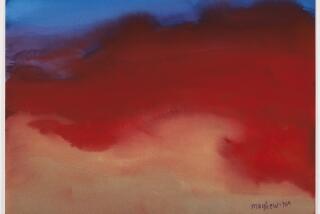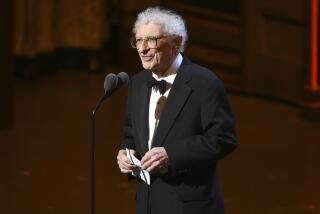ALBUM REVIEW
- Share via
With this unusual duo recording, Herbie Hancock and Wayne Shorter--two of the music’s most adventurous practitioners--make a groundbreaking effort to take jazz into a new realm of experience.
Shorter, playing only soprano saxophone, and Hancock, on acoustic piano, perform with the purity, the focus and the economy of a classical chamber duo. In fact, the most valid comparison might be to classical art song and lieder, with Shorter’s saxophone lines taking the role of the voice brilliantly accompanied by Hancock’s creatively interactive piano.
The result is an album that could only have been created by jazz musicians, one that applies their unique skills--the capacity to improvise, to swing, to articulate with blues and gospel qualities--to a personalized, nontraditional way of making music. Much of it will fall strangely on ears conditioned to standard approaches to jazz, but the rewards of listening are profuse.
Hancock and Shorter have been musical associates and personal friends for so long that their interaction with each other is symbiotic in character and quality. But long-term association alone is not enough to account for the solidity of the performances, which are rich with the creative sophistication of musical maturity. Improvised sections move with a constant receptivity to sudden discovery, and the written passages are performed with delicate sensitivity to each other’s musical presence.
The material is virtually all original. The sole exception is “Memory of Enchantment,” written by Michiel Borstlap, winner of the 1996 Thelonious Monk composition competition. Performed by Shorter and Hancock at the Kennedy Center in November 1996, it is the work that eventually triggered “1 + 1.”
Other pieces have been reworked from earlier usage: Hancock’s “Joanna’s Theme” was composed for the film “Death Wish,” and his “Sonrisa” was first recorded in Japan and later reworked as “Trust Me” on his “Feets Don’t Fail Me Now” album. Shorter’s “Diana” was written in the ‘70s for Airto Moreira and Flora Purim’s daughter. Of the pieces co-written for the album, “Visitor From Nowhere” and “Visitor From Somewhere” are variations on the same piece.
Shorter plays with a quality that ranges from gentle keening to harsh edginess, his work often filled with a stark emotionalism, sometimes tinged with an almost aggressive feeling of anger.
This is improvisation at its primal roots, improvisation that moves past the essentials of music to tap into the soul and the emotions. Hancock, seeming to sense the unusual passion in Shorter’s playing, largely assumes a supportive role, complex and revealing in its own way but clearly aimed at creating a framework for Shorter’s expressiveness.
The music is emotionally enriched by another quality--a feeling that is present almost from the very first notes of the opening work, Shorter’s “Meridianne--A Wood Sylph.”
The CD is the first recording from Shorter since his Brazilian wife, Ana Maria, died in the explosion of TWA Flight 800 off Long Island, N.Y., in July. It is tinged--particularly in Shorter’s playing--with a sense of longing and saudade, occasionally mixed with cries of anger and loss. As such, it is almost impossible to experience this intensely passionate album without sensing its deep undercurrent of emotion. --Don Heckman
*
Albums are rated on a scale of one star (poor), two stars (fair), three stars (good, recommended), four stars (excellent).
More to Read
The biggest entertainment stories
Get our big stories about Hollywood, film, television, music, arts, culture and more right in your inbox as soon as they publish.
You may occasionally receive promotional content from the Los Angeles Times.







